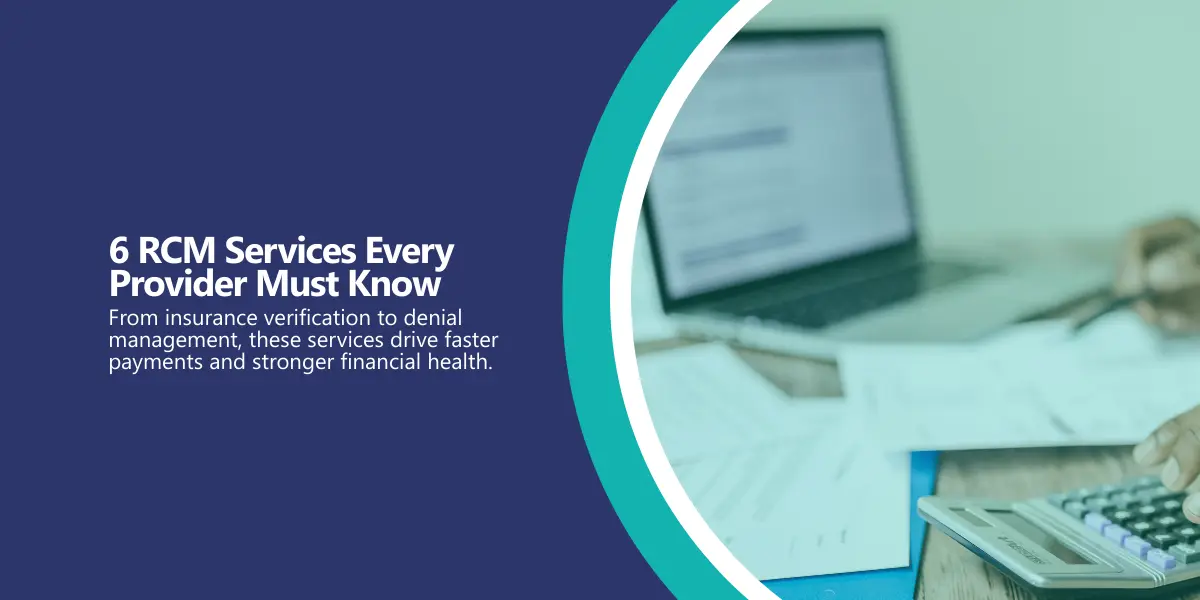Key RCM Services Every Healthcare Provider Should Know
For healthcare providers, delivering excellent patient care is only half the challenge. Behind the scenes, financial operations determine whether an organization can remain stable, invest in growth, and continue serving patients effectively. But billing complexity, claim denials, and evolving payer rules often leave internal teams overwhelmed.
That’s where Revenue Cycle Management (RCM) services come in. By outsourcing critical parts of the revenue cycle, providers can free up staff capacity, reduce financial leakage, and get paid faster—without adding headcount.
Quick Summary: What You’ll Learn
- The essential RCM services every provider should understand
- How these services reduce denials and improve cash flow
- Why outsourcing RCM helps providers focus on patient care
- Practical ways to identify gaps in your current revenue cycle
Why RCM Services Matter
Revenue Cycle Management (RCM) covers the full journey of a claim—from patient registration to final payment posting. When even one step in this cycle breaks down, the ripple effect is costly: slower reimbursements, mounting accounts receivable, and strained internal teams.
For providers under pressure to improve margins and manage costs, RCM isn’t just a back-office function—it’s a strategic lever for financial health.
Key RCM Services Every Provider Should Know
1. Insurance Verification
Verifying patient eligibility and coverage before services are delivered is one of the most important ways to prevent denials. Without this, providers risk delayed or unpaid claims.
2. Prior Authorization Management
Payers increasingly require prior approvals. Dedicated RCM support ensures requests are submitted correctly and on time, avoiding unnecessary delays in patient care and payment.
3. Claims Submission
Clean, accurate claims drive faster reimbursements. Specialized RCM teams ensure compliance with payer rules and reduce costly rework.
4. Denial Management
Denials are often preventable. RCM partners don’t just rework claims—they identify root causes and put processes in place to stop repeat issues.
5. Payment Posting & Reconciliation
Accurate posting ensures providers have a clear picture of cash flow, revenue trends, and outstanding balances. RCM teams track payments against claims and identify underpayments quickly.
6. Reporting & Analytics
Real-time dashboards on AR days, denial rates, and collection percentages give providers transparency—and the ability to make data-driven improvements.
Outsourcing RCM: Why It Makes Sense
Running these services in-house often means relying on overstretched teams, outdated systems, or costly hires. By outsourcing to an experienced RCM partner, providers gain:
- Scalable support without the burden of recruitment and training
- Fewer denials through process standardization and compliance expertise
- Faster cash flow thanks to timely submissions and follow-up
- More focus on patients instead of paperwork
Signs It’s Time to Reevaluate Your RCM Strategy
- Denials and rework are eating up too much staff time
- Cash flow is unpredictable and AR days are rising
- Your team is spending more energy on billing than on patient-facing tasks
- You’re struggling to keep up with payer rule changes
If these challenges sound familiar, it may be time to explore outsourcing part—or all—of your revenue cycle.
Let’s Talk About Your RCM Needs
At DME Service Solutions, we help healthcare providers reduce denials, accelerate collections, and gain full visibility into their revenue cycle.
👉 Schedule a free 15-minute consultation with our RCM experts and discover which services can deliver the fastest impact for your organization.

